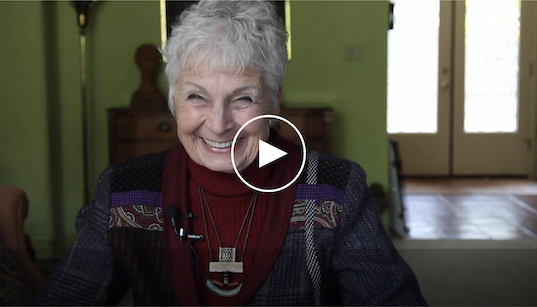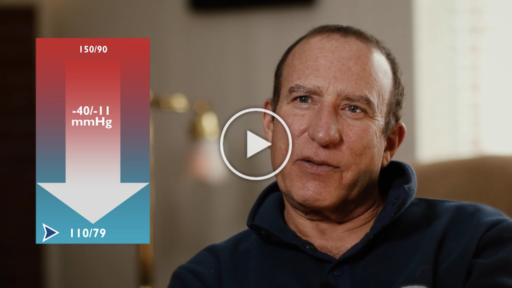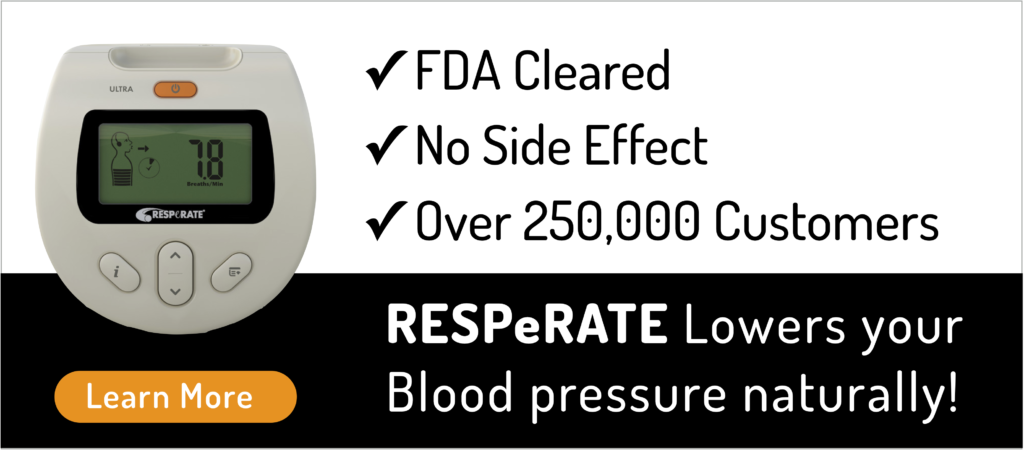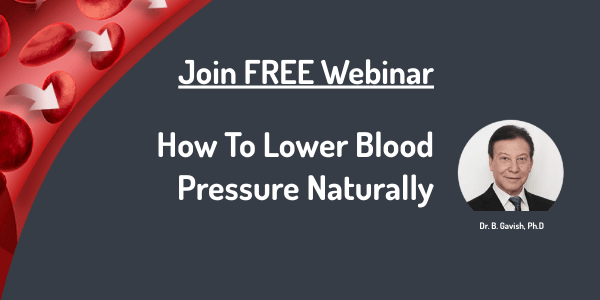A Few words of introduction to this guest post.
Reducing or even eliminating anti-hypertension medications is one of the top questions we receive. Our standard answer is RESPeRATE will bring your blood pressure down and it will be up to your doctor to adjust the medications as he or she is responsible for your overall treatment regimen. We further warn that you should not modify the medications on your own.
While the answer is right on, we thought you might be interested in a more detailed personal perspective from one of the country’s leading Preventive Medicine experts, Dr. Ford Brewer, who recently got his blood pressure down using RESPeRATE.
Dr. Brewer started as an Emergency Doctor. After seeing to many preventable heart attacks, he went to Johns Hopkins to learn Preventive Medicine and eventually led the postgraduate program in prevention. Dr. Brewer has over 25 publications in peer-reviewed medical journals and has run several large medical staff teams in prevention, primary care, and telemedicine.
In his quest to “make stroke optional” he co-founded PrevMed Heart Attack and Stroke Prevention and created a very popular Youtube channel dedicated to prevention. (see links at the bottom).
Recently, Dr. Brewer reported to us that after using RESPeRATE his blood pressure dropped to 102/64, numbers which he has not seen in decades.
Following, Dr. Brewer decided to offer RESPeRATE to his patients and was happy to indulge us with the below guest post.
——————————————————————————————————————————–
Can You Drop Your Anti-Hypertensive Medications?
My short answer to the question is it possible to eliminate any-hypertensive medications is YES. BUT it must be done methodically and responsibly together with your doctor.
The professional terminology for the process is “step-down procedure”, which I’ll detail below but let me take you from the top.
Lowering Your Risk
As a physician seeing a patient with consistently high blood pressure readings my number one concern is lowering your risk of stroke, heart failure, kidney failure, etc.
The data is very clear. If I can reduce your blood pressure toward the optimal 115/75 points I can literally save you from having a cardiovascular event. Having spent years as an ER doctor I can attest it’s not something you want to have.
With that in mind, I look at you, the patient trying to quickly assess if I have to put you on medication ASAP or we can try a couple of months of lifestyle modification first.
If your readings are not crazy and you seem like a person who has the motivation I’ll put in the extra effort and customize a plan for you. Losing extra weight, exercise, dietary changes, supplements, and more recently RESPeRATE. You probably know the drill. If not check my Youtube channel and website below, as it’s not the subject of this post.
If your readings are very high you’re getting a prescription on the spot – I would rather be safe than sorry.
Life On Medication
Anti-hypertensive medications are safe, but I know from personal experience that some can have side effects.
To make things worse, in many cases, one anti-hypertensive medication is not enough to get your readings to where they need to be even if initially it worked.
With some patients, it’s a long process of trying out different mediation classes and combinations until we get that stubborn blood pressure under control.
In some cases, it means two, three, or even more medications if you can tolerate it. This opens up Pandora’s box of drug-to-drug interaction, but I’m simply not going to have you having a stroke.
By this point, I hope you can now better appreciate why I or any other physician might be reluctant to play ball with a patient who “simply” wants to eliminate their medications.
So what can be done?
Eliminating The Additional Medication
The easiest path to eliminating an anti-hypertensive medication is actually not adding a new one.
Now, this might sound trivial but it’s actually a very powerful and common scenario in my practice.
So you are already on one or two medications but your blood pressure is still too high. The standard operating procedure is to increase the dosage or add an additional medication.
That said, I will be very open to postponing the decision by a couple of months IF you, the patient, show real commitment to implement that non-drug plan treatment plan I’ve put for you including taking a daily blood pressure reading at home.
I have countless patients whom together we were able to successfully get their blood pressure under control without adding that additional medication.
Step-Down & Washout Procedures
Let me begin with the latter. A washout procedure is a term typically used in clinical trials for new medications. To ensure the effect measured is of the new medications, patients are instructed to stop taking their old medication for a period of time.
A large systematic review of clinical trials using such procedure in hypertension published in the hypertension journal demonstrated a striking result.
The blood pressure of 40% of the patients remained controlled a year after the washout and 25% of the patients had controlled blood pressure two years later. This was more the case for patients on a single anti-hypertensive (mono-therapy), had lower blood pressure prior to the washout, and with lower body weight.
The Factors To Eye-Popping Percentage Including:
- Initial misdiagnosis: Some studies suggest that up to 26% of diagnosed with hypertension patents actually had the white-coat syndrome.
- Effective Lifestyle modifications.
- Excessive dosage: in some cases, older guidelines had what is now consider excessive dosage leading to side effects w/o extra benefits.
Watch How Mark Lowered His Blood Pressure Naturally. It was 150/100, this morning it was 110/79 Watch Video
A word of caution – don’t go rushing to “washout” your medication on your own hoping you’ll be in the 25% and having a stroke in the process. Read on.
Now the step-down procedure is basically a controlled withdrawal of one or more medications AFTER your blood pressure was controlled for one year or more. The approach has been advocated recently by some of the country’s leading hypertension specialists and I wholeheartedly support it.
Summary & Things To Avoid
If my patient’s blood pressure is well controlled and has no side effects I’m content and I frankly wouldn’t initiate any a washout or step-down procedure. However, I’m happy to play ball if the patient asks me to do so.
From a physician perspective the key principle to avoiding additional medications, a step-down,- or washout procedure are all similar:
1. First and foremost, a patient who understands we are on the same team trying everything is the toolbox for their lower cardiovascular event risk.
2. Second, increased monitoring of blood pressure to keep a tab on both trends and spikes. Daily home blood pressure is preferred and I typically want to see the readings more frequently.
3. Third, a customized lifestyle modification plan that will work for the patient – If you have extra weight we will deal with it. The 30 minutes of exercise most days of the week, the dietary changes and supplements you might need, and lastly RESPeRATE (which your physician might not be acquainted with). Your physician knows it all but you’ve got to help him or her help you and really do it.
4. Let stress again NOT do this alone. You have to work with your physician. I’m serious, skipping days or changing dosage can lead to dangerous blood pressure spikes and abruptly stopping some particular medication classes for example short-acting beta-blocker class (eg, propranolol as Inderal or an alpha-2 agonist (eg, clonidine as Catapres, guanfacine as Tenex, guanabenz as Wytensin) can lead to fatal withdrawal syndrome.
The bottom line is YES, eliminating your blood pressure meds is possible so please simply work with your doctor.
You are welcome to visit me at:










 Download Brochure
Download Brochure
I have been a follower of Dr. Brewer for quite some time. Because of his recommendations on testing, I was able to have a meaningful dialogue with my Dr. about the need for statins and blood pressure medicine. Most physicians go by “guidelines” without really looking at the whole person. It was only after I showed her all the tests I took on my own that she agreed I was at low risk for heart attack and stroke. I feel that many put people on stuff, “just because” for example – recent studies indicated no need to take an aspirin a day if you have not had a heart attack or stoke or at high risk just because of your age. So I always ask questions “at my age, is this really necessary”? I am a health care provider and see patients with long lists of meds and they wonder why they have brain fog or tired all the time. I advise them to have a long conversation with their Doctor to discuss risk vs benefit. My two cents worth.
Hi Sandra, Thank you for sharing with us. Kindest Regards.
My blood pressure is regularly 147/72.
I take my reading daily. I have been on several different blood pressure medications for past nine months.
None have lowered my blood pressure except Sildenifil during happier times. Then it goes too low.
Tried Resperate this morning , first time. Blood pressure reading is 122/72.
This is exciting!
Hi Jerry, That is wonderful! Thank you for sharing. Kindest Regards, Eli, Content Manager.